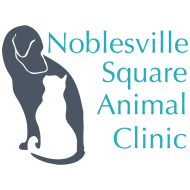Senior Pet Care
At Noblesville Square Animal Clinic, we love providing senior pets with the care and support they need as they get older. Our loving family members deserve the best care for all of the love they have provided us throughout the years. Changes that may occur as your family member ages may include:
- Reduced hearing
- Changes in eyesight
- Dental Disease
- Arthritis and loss of muscle mass
- Cognitive dysfunction (dementia)
- Heart and kidney disease
It is important to remember that the aging process is accelerated in pets when compared to people. Early detection of these changes can help prevent the progression of the disease and minimize the suffering of a senior pet. Since pets hide their sickness and illness, it can be difficult for an owner to notice when changes are occurring. During the wellness exam, our doctors and staff will ask you questions that specifically target common medical issues that are common to senior pets. Working together with you, we will develop a great plan to ensure optimal health for your family members.
The body condition of dogs and cats is an important part of their health. It is important to determine if your family member is overweight, underweight, or ideal body weight. Carrying extra weight is especially detrimental for a senior pet and will impact the quality of its life especially when there are arthritis and some metabolic conditions. Any loss of weight is a potential early sign of illness. Because of decreased physical activity and slowed metabolism, aging animals may need 20% fewer total calories than middle-aged pets.
Dental disease is especially common in senior pets because it progresses gradually and can easily go unnoticed. Research shows that 80% of dogs and cats by the age of 3 years of age have periodontal disease. Senior pets simply adapt to living with discomfort. However, adapting to discomfort doesn’t mean that they are not in pain. It is our goal to diagnose and treat all dental disease in senior pets to allow them to live comfortably during their senior years.
Exercise is still an essential component of any senior pet regimen. Dogs tend to age better both physically and mentally with daily exercise. Even a short walk is an important part of their routine. However, an important rule of thumb is to keep their exercise both consistent and moderate in length. Daily or every other day walks improve and maintain muscle mass. The duration of the walk will depend on the dog’s level of fitness. Cats benefit from exercise as well. Options for exercise in cats include laser pointers (be careful of eyes), feathers attached to a string, toy mice that move or chirp, and toys that hold food/treats that require movement to release the food.
